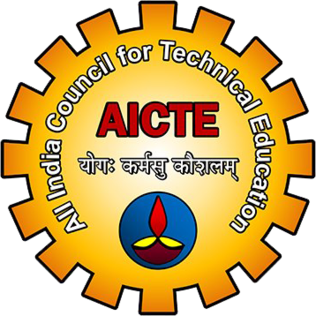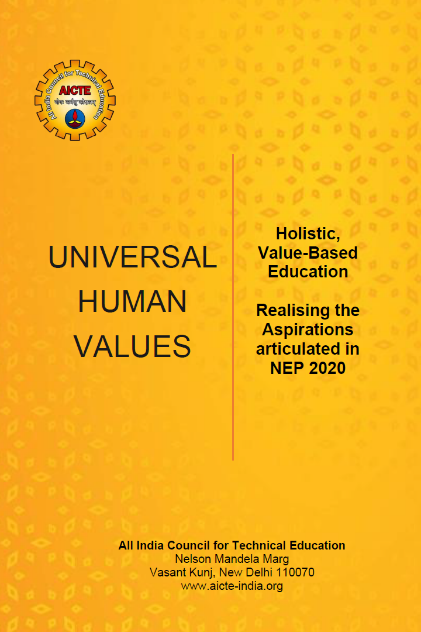

Holistic, Value-Based Education for Realising the Aspirations articulated in NEP 2020
Circulars

“AICTE has produced this document as a broad framework of "Universal Human Values for Holistic Value-based Education”, which will go a long way in realizing the vision of NEP 2020… It will help our teachers and faculty across school and higher education to understand the concepts in value-based education in detail and learn some strategies to implement in classroom practices… I congratulate AICTE and everyone who has been a part of developing such an important document in education”
– Sh. Dharmendra Pradhan, Hon’ble Minister Education, Government of India
Holistic Education is based on a holistic vision of life; a vision which is founded on understanding the existential reality and the human existence in its completeness, which results in identifying the role of human being in this whole, in all levels (individual, family, society and Nature) and dimensions (doing, thinking, feeling and understanding). The role or participation of a human being in each level is the value of a human being. Hence, the holistic vision of life is a comprehensive and unifying framework for all that is valuable for all, human beings as well as the rest of Nature. It gives clarity about human values in all aspects of human existence as a whole. In order to ensure fulfilment of these values, we also need skills; therefore, all types of skills are defined and developed in the context of these values.
Education on all these (vision, values and skills) put together is Holistic Value Based Multidisciplinary Education. It may be further expanded as:
- Education on values founded on a holistic and humane world vision.
- Courses, examples and case studies of local, regional and national values, languages and skills to reinforce and exemplify a holistic and humane world vision.
- Learning and practicing multiple, complementary skills that are Nature Friendly and Human Friendly.
- Behaviour for mutual fulfilment, team work, collaboration…
- Science, technology, management for mutual prosperity
- Service (seva) which promotes harmony in family, society
- Meaningful participation in the family, neighbourhood, institution, workplace, community, etc. all the way to the Nation and beyond for societal development
Multidisciplinary Education is defined in the light of this as giving education for different values and skills required for leading a meaningful and fulfilling life in all aspects (disciplines) of human living, in the context of a holistic vision of life.
Such education will be very much in tune with our glorious cultural and civilizational effort for the wellbeing of all. It will be a tangible step in achieving the expectations from education that are articulated in the NEP 2020, i.e., “achieving full human potential, developing an equitable and just society, and promoting national development”.
The effectiveness of education can be greatly enhanced by providing it in the home language/ mother tongue/ local language/ regional language.

“Universal Human Values has been a game changing work ongoing from AICTE. We are committed to continue and strengthen it…”
– Prof. Anil D Sahasrabudhe, Former Chairman AICTE

“It is very important that we take these human values to our students… We would like to work with you… We will work together and have a greater reach to millions of students across the country… the courses on universal human values, are worth considering by every Indian University”
– Prof. M Jagadesh Kumar, Chairman UGC

“The work done by AICTE in the last 5 years in orienting/preparing teachers for value education is a role model for us… We intend to adapt the same for our pre-service and in-service teachers, and also to introduce it in the programs like B. Ed. for student teachers”
– Prof. Dinesh Prasad Saklani, Director NCERT
